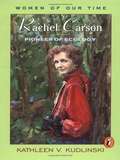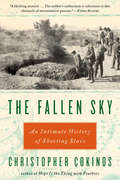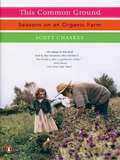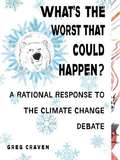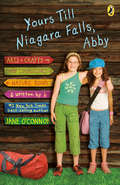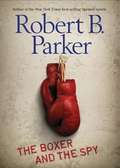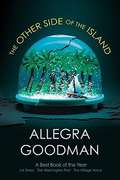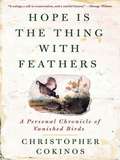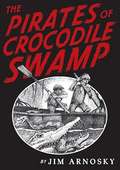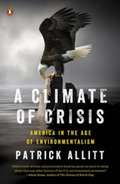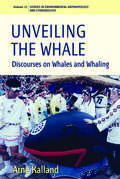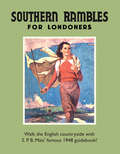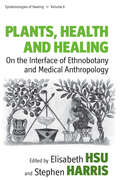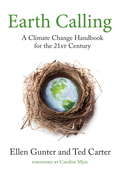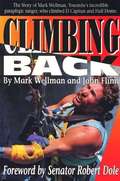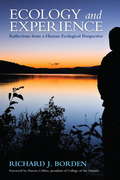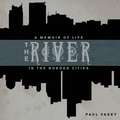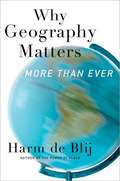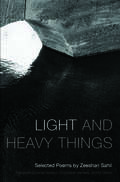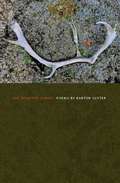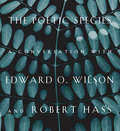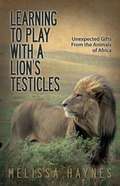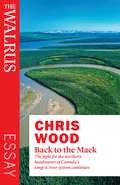- Table View
- List View
Rachel Carson
by Kathleen V. KudlinskiRachel Carson--scientist, author, and environmentalist Rachel Carson was always fascinated by the ocean. As a child, she dreamed of it and longed to see it. As a young woman, she felt torn between her love for nature and her desire to pursue a writing career. Then she found a way to combine both. Rachel had a talent for writing and talking about science in a way that everyone could understand and enjoy. With her controversial book, Silent Spring, Rachel Carson changed the way we look at our planet. "Kudlinski has admirably captured the driving force of spirit of a shy but courageous woman in a succinct, respectful approach."--Booklist About the Women of Our Time series: International in scope, the Women of Our Time series of biographies cover a wide range of personalities in a variety fields. More than a history lesson, these books offer carefully documented life stories that will inform, inspire, and engage.
The Fallen Sky
by Christopher CokinosIn this acclaimed volume, prizewinning poet and nature writer Christopher Cokinos takes us on an epic journey from Antarctica to outer space, weaving together natural history, memoir, and in-depth profiles of amateur researchers, rogue scientists, and stargazing dreamers to tell the riveting tale of how the study of meteorites became a modern science. .
This Common Ground
by Scott ChaskeyIn the tradition of Michael Pollan, Joan Gussow, and Verlyn Klinkenborg's The Rural Life, This Common Ground is an inspirational evocation of a life lived close to the earth, written by the head farmer at one of the country's first community-supported farms. By reflecting on four seasons of activity at his beloved Quail Hill Farm in eastern Long Island, Scott Chaskey offers stirring insight into the connections between land and the human family. Whether writing about the voice of a small wren nesting in the lemon balm or a meadow of oats, millet, and peas rising to silver and green after a fresh rain, this poet-farmer's contagious sense of wonder brings us back to our bond with the soil. .
What's the Worst That Could Happen?
by Greg Craven6. 5 million YouTube viewers can't be wrong: A provocative new way to look at the global warming debate. Based on a series of viral videos that have garnered more than 6. 5 million views, this visually appealing book gives readers-be they global warming activists, soccer moms, or Nascar dads-a way to decide on the best course of action, by asking them to consider, "What's the worst that could happen?" And for those who decide that action is needed, Craven provides a solution that is not only powerful but also happens to be stunningly easy. Not just another "change your light bulb" book, this intriguing and provocative guide is the first to help readers make sense-for themselves-of the contradictory statements about global climate change. The globe is warming! or The globe is not warming. We're the ones doing it! or It's a natural cycle. It's gonna be a catastrophe! or It'll be harmless. This is the biggest threat to humankind! or This is the biggest hoax in history.
Yours Till Niagara Falls, Abby
by Jane O'ConnorAbby does everything she can to get her parents to let her go to sleepaway camp with her best friend, and at the last minute, her friend has to stay home! How will Abby survive this huge new adventure by herself? [From the back cover:] Dear Merle, Don't feel too guilty, but so far I'm miserable ... And who wouldn't be? After all, it took months for Abby Kimmel to convince her parents to let her go to camp with her best friend. But Merle breaks her ankle and can't go at all! If that isn't bad enough, Abby shares a bunk with the Camp Pinecrest goody-goody, two other bunkmates gang up on her, she gets poison ivy, and she can't learn to dive! Before it's over, though, Abby discovers the secret fun of camp, and her funny letters to Merle and her family reveal that it all turns out better than she'd expected.
The Boxer and the Spy
by Robert B. ParkerAnother teen thriller from the New York Times bestselling author of the Spenser mysteries. When a shy high school student?s body is found washed up on the shore of a quiet New England beach town?an apparent suicide?fifteen-year-old Terry Novak doesn?t know what to think. Something just doesn?t add up, so he decides to do some investigating of his own with the help of his best friend, Abby. It doesn?t take long before they learn that asking questions puts them in grave danger, and surviving is going to be a fight. Fortunately, Terry has been learning a thing or two about fighting, thanks to a retired boxer named George, who teaches the boy to use his head and always keep his feet set beneath him?lessons Terry takes to heart in more ways than one. He will need to. Robert B. Parker, New York Times bestselling author of the Spenser novels, delivers a taut, empowering mystery for young readers. .
The Other Side of the Island
by Allegra GoodmanFrom New York Times bestselling author Allegra Goodman comes a post apocalyptic novel about love, loss, and the power of human choice. Honor and her parents have been reassigned to live on Island 365 in the Tranquil Sea. Life is peaceful there—the color of the sky is regulated by Earth Mother, a corporation that controls New Weather, and it almost never rains. Everyone fits into their rightful and predictable place. . . . Except Honor. She doesn’t fit in, but then she meets Helix, a boy with a big heart and a keen sense for the world around them. Slowly, Honor and Helix begin to uncover a terrible truth about life on the Island: Sooner or later, those who are unpredictable disappear . . . and they don’t ever come back. The Other Side of the Island has been named a Best Book of 2008 by the LA Times, Washington Post, and Village Voice. .
Hope Is the Thing With Feathers
by Christopher CokinosWeaves together natural history, biology, sociology, and personal narrative to tell the story of the lives, habitats, and deaths of six extinct bird species. This book is, in part, an effort to make certain that we never again forget extinct species nor the others of which Cokinos write. As Cokinos traveled to libraries and natural history museums, he learned of other vanished birds: the Ivory-billed Woodpecker, the Heath Hen, the Passenger Pigeon, the Labrador Duck and the Great Auk. He was moved to write about them, and the result is this impressive book about the ¿ghost species¿ of the North American continent. The cover has the look of stained and mottled pages from a naturalist¿s notebook. Illustrations.
Trees
by Peter A. ThomasTrees are vital to the healthy functioning of the global ecosystem and unparalleled in the range of materials they provide for human use. This volume is a comprehensive introduction to the natural history of trees, with information on all aspects of tree biology and ecology in easy-to-read and concise language. Peter Thomas uncovers fascinating insights into these ubiquitous plants, addressing in an illuminating way questions such as how trees are designed, how they grow and reproduce, and why they eventually die. Written for a nontechnical audience, the book is nonetheless rigorous in its treatment and a valuable source of reference for beginning students as well as interested lay readers.
The Pirates of Crocodile Swamp
by Jim ArnoskyA long way from home, Sandy and Jack Casperin escape their abusive father and disappear into Crocodile Swamp, a remote wilderness in the Florida Keys. With nothing but their wits and limited supplies, the boys must learn to fend for themselves as they survive surrounded by snakes, massive crocodiles and a territorial hammerhead shark. But it is only with the help of newfound friends?a local girl their age, and an old sailor (who might be a real pirate!)? that they can truly escape from their tragic past and make a new life for themselves. .
A Climate of Crisis
by Patrick AllittA provocative history of the environmental movement in America, showing how this rise to political and social prominence produced a culture of alarmism that has often distorted the facts Few issues today excite more passion or alarm than the specter of climate change. In A Climate of Crisis, historian Patrick Allitt shows that our present climate of crisis is far from exceptional. Indeed, the environmental debates of the last half century are defined by exaggeration and fearmongering from all sides, often at the expense of the facts. In a real sense, Allitt shows us, collective anxiety about widespread environmental danger began with the atomic bomb. As postwar suburbanization transformed the American landscape, more research and better tools for measurement began to reveal the consequences of economic success. A climate of anxiety became a climate of alarm, often at odds with reality. the sixties generation transformed environmentalism from a set of special interests into a mass movement. by the first Earth Day in 1970, journalists and politicians alike were urging major initiatives to remedy environmental harm. In fact, the work of the new Environmental Protection Agency and a series of clean air and water acts from a responsive Congress inaugurated a largely successful cleanup. Political polarization around environmental questions after 1980 had consequences that we still feel today. Since then, the general polarization of American politics has mirrored that of environmental politics, as pro-environmentalists and their critics attribute to one another the worst possible motives. Environmentalists see their critics as greedy special interest groups that show no conscience as they plunder the earth while skeptics see their adversaries as enemies of economic growth whose plans stifle initiative under an avalanche of bureaucratic regulation. There may be a germ of truth in both views, but more than a germ of falsehood too. America's worst environmental problems have proven to be manageable; the regulations and cleanups of the last sixty years have often worked, and science and technology have continued to improve industrial efficiency. Our present situation is serious, argues Allitt, but it is far from hopeless. Sweeping and provocative, A Climate of Crisis challenges our basic assumptions about the environment, no matter where we fall along the spectrum--reminding us that the answers to our most pressing questions are sometimes found in understanding the past.
Unveiling The Whale
by Arne KallandWhaling has become one of the most controversial environmental issues. It is not that all whale species are at the brink of extinction, but that whales have become important symbols to both pro- and anti-whaling factions and can easily be appropriated as the common heritage of humankind. This book, the first of its kind, is therefore not about whales and whaling per se but about how people communicate about whales and whaling. It contributes to a better understanding and discussion of controversial environmental issues: Why and how are issues selected? How is knowledge on these issues produced and distributed by organizations and activists? And why do affluent countries like Japan and Norway still support whaling, which is of insignificant economic importance? Basing his analysis on fieldwork in Japan and Norway and at the International Whaling Commission, the author argues how an image of a "superwhale" has been constructed and how this image has replaced meat and oil as the important whale commodity. He concludes that the whaling issue provides an arena where NGOs and authorities on each side can unite, swapping political legitimacy and building personal relations that can be useful on issues where relations are less harmonious.
Southern Rambles for Londoners
by S. MaisIn 1948 with post-war Britain's sense "dulled by traffic and by bombs", this pocket-sized book was a clarion call for readers to rediscover the beauties of the idyllic English countryside. Published by Southern Railways, it recounts the joys of listening to birdsong, picking whortleberries, gazing at the clouds and "being genial" in the bars of tiny village inns - experiences that had been obscured by war, deprivation and the bus and train journeys that suburbanization had brought. Offering twenty real country walks around Surrey and Kent, this guide reveals where the 1940s rambler would be "most likely to find quietude and loveliness" - as well as the best cakes!
Plants, Health And Healing
by Stephen Harris Elisabeth HsuPlants have cultural histories, as their applications change over time and with place. Some plant species have affected human cultures in profound ways, such as the stimulants tea and coffee from the Old World, or coca and quinine from South America. Even though medicinal plants have always attracted considerable attention, there is surprisingly little research on the interface of ethnobotany and medical anthropology. This volume, which brings together (ethno-)botanists, medical anthropologists and a clinician, makes an important contribution towards filling this gap. It emphasises that plant knowledge arises situationally as an intrinsic part of social relationships, that herbs need to be enticed if not seduced by the healers who work with them, that herbal remedies are cultural artefacts, and that bioprospecting and medicinal plant discovery can be viewed as the epitome of a long history of borrowing, stealing and exchanging plants.
Earth Calling
by Caroline Myss Ted Carter Ellen GunterOur earliest mythologies tell us we all start as a little bit of dirt. These stories carry a profound message: each of us is born with a deep and abiding connection to the earth, one that many of us have lost touch with. The Silent Spring for today's environmental activists, this book offers an invitation to reestablish our relationship with nature to repair our damaged environment. Chapter 1 examines the threats to the planet's health through the lens of the human energy system known as the chakras, describing how the broken first chakra relates to our disconnection from our biosphere. Chapter 2 shows how our current environmental crises--global warming, climate change, dwindling water resources, natural disasters such as wildfires and hurricanes--represent severe manifestations of our disconnection from the earth.Chapter 3 describes how the preponderance of oil in our culture--especially agribusiness--compounds this disconnection, from our dependence on other countries for our energy, to current issues of oil depletion, peak oil, and fracking, to the dumbing down of our agricultural polyculture.Chapter 4 explains how the most basic building blocks of our nourishment--seeds--are being compromised with a loss of biodiversity and rise of GMOs, and how that adversely affects the farmers whose sacred connection to the land has in many cases been severed. Chapter 5 describes the ways in which we as individuals can begin to wake up to climate activism as a spiritual practice. This chapter includes specific activities that you can use to implement change and heal your own connection to the earth. By learning and practicing ritual and understanding the earth's rhythms and seasonal rites of passage, each of us can find unique ways to heal our own connections and help others heal theirs. Chapter 6 brings to life Goethe's wisdom: "Knowing isn't enough; neither is being willing. We must do," by providing strategies and resources for exploring how each of us can find our own Earth Calling, then anchoring that calling with the only force that ignites change: Action.From the Trade Paperback edition.
Climbing Back
by Mark Wellman John FinnThere is almost no limit to what we can accomplish--except perhaps in our own minds. Mark Wellman's relentless struggle to survive a disabling accident to become a park ranger and an accomplished wheelchair athlete, and ultimately to climb the sheer granite faces of Yosemite's El Capitan and Half Dome challenges all of us to continue to strive toward loftier goals. Foreword by Senator Robert Dole.
Sea-Level Science
by David Pugh Philip WoodworthThis book gives a comprehensive overview of our present understanding of the Earth's cryosphere, its changes and their consequences for mean sea level changes. Since the middle of the 19th century there has been an increase of sea level height by 20-25 cm. Some 8-10 cm of this is due to net losses from glaciers, the remainder being due to mass losses from land ice and thermal expansion of the oceans. The mean sea level rise is slowly accelerating; at present it is some 3 mm/year. Recent space observations made by the GRACE satellite combined with ocean temperature and volume measurements have enabled the separate contributions to sea level rise from melting ice and from thermal expansion to be better estimated. The estimation of mean sea level change is complicated by changes in land level due to tectonic effects and to ongoing changes following the latest major glaciation. The book gives an up-to-date survey of our present knowledge of this crucial subject.
Ecology and Experience
by Richard J. Borden Darron CollinsA philosophical and narrative memoir, Ecology and Experience is a thoughtful, engaging recounting of author Richard J. Borden's life entwined in an overview of the intellectual and institutional history of human ecology--a story of life wrapped in a life story. Borden shows that attempts to bridge the mental and environmental arenas are uncertain, but that rigid conventions and narrow views have their dangers too. Human experience and the natural world exist on many levels and gathering from both realms gives rise to novel constellations. In a blend of themes and approaches based on a lifetime of interdisciplinary inquiry, the author wanders these intersections and invites us to exercise our capacities for ecological insight, to deepen the experience of being alive, and, most of all, to more fully enrich our lives.ContentsForeword by Darron Collins, president of the College of the AtlanticPrefacePart I. Transects and Plots1. The Arc of Life2. Ecology3. Experience4. Human Ecology5. EducationPart II. Facets of Life6. Time and Space7. Death in Life8. Personal Ecology9. Context10. Metaphor and MeaningPart III. Wider Points of View11. Kinds of Minds12. Insight13. Imagination14. Keyholes15. Ecology and Identity16. The Unfinished CoursePart IV. CodaFrom the Trade Paperback edition.
The River
by Paul Vasey"Ask anyone what they love most about Winzer, and they seem always to tell you it's the people, the family and friends webbed around each of us. True. But for me the town is also, and perhaps mainly, the larger-than-life characters who ghost around in my imagination and my memory: rumrunners and prize fighters and elegant old ladies and one-eyed thugs and earnest well-meaning politicians and hucksters and hookers and crusty old editors. Many of them I remember meeting. Some of them I actually met." -from The RiverThe River is Paul Vasey's tribute to a place he discovered by accident and loved over a lifetime. Chatty, anecdotal, personal and passionate, by one of Windsor's most celebrated reporters and radio hosts, this meandering memoir winds its way around a river town whose sights and characters may never be fully charted: a Windsor that fired a reporter's imagination, stole his heart, and eventually became the place he calls home.
Why Geography Matters: More Than Ever
by Harm De BlijFor anyone trying to understand our complex and dynamic world, this book offers not only a unique trove of concepts and ideas, but links them clearly and directly to world events.
Light and Heavy Things
by Christopher Kennedy Faisal Siddiqui Zeeshan Sahil Mi DitmarLight and Heavy Things provides readers in this country an opportunity to discover the work of the late Pakistani poet, Zeeshan Sahil. Although readers of Urdu poetry mourned his passing in 2008, Sahil is a relatively unknown poet in the United States. Sahil's work conveys his post-modern sensibility with plain language, presenting political realities of Pakistan in personal terms.
The Reindeer Camps
by Barton SutterA winner of the Minnesota Book Award in fiction, poetry, and non-fiction, Barton Sutter's latest collection details life on the Canadian border, presents portraits of northern plants and animals, rejoices in marriage, and traces the ancient ways of Siberian reindeer herders. The late Bill Holm called it "unlike anything Sutter (or anyone else) has done before." Sutter's poetry reminds us that other cultures have survived for millennia by living closer to the ground.Born in 1949, Barton Sutter was raised in Minnesota and Iowa. He retired from the University of Wisconsin-Superior in 2011 and now lives in Duluth, Minnesota.
The Poetic Species
by Edward O. Wilson Robert Hass Lee Briccetti"Wilson brilliantly analyzes the force, at once creative and destructive, of our biological inheritance and daringly advances a grand theory of the origins of human culture." -STEPHEN GREENBLATT, author of The Swerve on Edward O. Wilson's The Social Conquest of Earth"Hass [is] a philosophically attentive observer, deep thinker, and writer who dazzles and rousts." -Booklist on Robert Hass' What Light Can DoIn this shimmering conversation (the outgrowth of an event co-sponsored by the American Museum of Natural History and Poets House), Edward O. Wilson, renowned scientist and proponent of "consilience" or the unity of knowledge, finds an ardent interlocutor in Robert Hass, whose credo as U.S. poet laureate was "imagination makes communities." As they explore the many ways that poetry and science enhance each other, they travel from anthills to ancient Egypt and to the heights and depths of human potential. A testament to how science and the arts can join forces to educate and inspire, it ends in a passionate plea for conservation of all the planet's species.Edward O. Wilson, a biologist, naturalist, and bestselling author, has received more than 100 awards from around the world, including the Pulitzer Prize. A professor emeritus at Harvard University, he lives in Lexington, Massachusetts.Robert Hass' poetry is rooted in the landscapes of his native northern California. He has been awarded the MacArthur "Genius" Fellowship, the National Book Critics Circle Award (twice), the Pulitzer Prize, and the National Book Award. He is a professor of English at University of California-Berkeley.
Learning to Play With a Lion's Testicles
by Melissa HaynesThe cheeky title of Melissa Haynes's story of adventure in Africa, Learning to Play with a Lion's Testicles, earned the book some big publicity on NBC-TV/Late Night with Jimmy Fallon on September 4,2013 where it topped the show's list of "Titles Not to Read" for September 2013. Melissa's book was also a big smash on the March 11, 2014 Ellen Show, where Ellen and guest Ricky Gervais highlighted the book throughout the entire hour. Playing with a lion's testicles: An African saying that means to take foolhardy chances.Melissa, an exhausted executive from the city seeks meaning and purpose from her work, and volunteers for a Big Five conservation project in South Africa. Her boss, an over-zealous ranger, nicknamed the Drill Sergeant, has no patience for city folk, especially if they're women, and tries to send her packing on day one. But Melissa stands her ground with grit and determination, however shaky it may be.Conflict soon sets the pace with a cast filled with predatory cats, violent elephants, and an on-going battle of wits with the Drill Sergeant. Even Mother Nature pounds the reserve with the worst storm in a century. But the most enduring and profound conflict is the internal battle going on within Melissa, as she tries to come to terms with the guilt surrounding her mother's death. When death grips the game reserve, it is the very animals Melissa has come to save that end up saving her.For the reader who has ever dreamed of going to Africa or knows the pain of loss and guilt, LEARNING TO PLAY WITH A LION'S TESTICLES will fill your soul.
Back to the Mack
by Chris WoodBack to the Mack is an ebook by award-winning journalist and author Chris Wood. It contains his seminal story about the Mackenzie River, "The Last Great Water Fight," first featured in the October 2010 issue of The Walrus. The ebook also includes "Back to the Mack," in which Wood returns to the Mackenzie four years after his original story and chronicles the development of natural resources affecting both the river and the extensive ecosystems and communities it supports. These two articles also serve as companion content to the brand-new original documentary http://thewalrus.ca/cold-amazon, produced by the Walter and Duncan Gordon Foundation. Cold Amazon will be available to view for free as of March 17 at http://thewalrus.ca/cold-amazon.
